
Assam CM Reviews Implementation of 'Nijut Moina 2.0' Scheme for Empowering Girl Students

 :
| Updated On: 31-Jul-2025 @ 1:53 pm
:
| Updated On: 31-Jul-2025 @ 1:53 pmSHARE
On Wednesday, Assam Chief Minister Himanta Biswa Sarma chaired a high-level review meeting to assess the state’s preparedness for the implementation of the second phase of the state government’s flagship scheme, ‘Nijut Moina 2.0’, which aims to provide financial support to girl students pursuing higher education. The initiative is a critical component of Assam’s ongoing efforts to empower young girls, encourage continued education, and curb the menace of child marriage across the state.
The review meeting, which was conducted via video conferencing, brought together a wide spectrum of stakeholders including cabinet ministers, Members of the Legislative Assembly (MLAs), deputy commissioners (DCs), heads of educational institutions, and senior officials from the education department. The primary focus of the discussion was to ensure seamless execution of the scheme across districts and to address any logistical, administrative, or technical issues that could arise during its rollout.
During the review, Chief Minister Sarma emphasized the significant impact the first phase of the ‘Nijut Moina’ scheme had made. In a post shared on his social media platform X (formerly Twitter), he stated, “The fight against child marriage gets stronger. Last year, our flagship scheme #NijutMoina helped close to 2 lakh girls with ₹132 crore in assistance.” This data reflects both the reach and scale of the program and demonstrates the government’s commitment to removing financial barriers that prevent girls from completing their education.
The second edition of the scheme, ‘Nijut Moina 2.0’, is designed not only to expand the benefits of the initial phase but also to deepen its social and educational impact. By focusing on economically disadvantaged backgrounds, the scheme seeks to target those most vulnerable to early marriage and education discontinuation. Through direct financial aid, the program enables young women to continue their academic journeys, which in turn helps break the cycle of poverty and gender-based inequality.
The government views the scheme as a holistic intervention—not just in terms of educational support, but as a strategic tool in social reform. By keeping girls in schools and colleges longer, the program indirectly discourages child marriage, builds aspirations, and promotes gender equity.
In preparation for the second rollout, the Chief Minister’s Office is working closely with district administrations and educational institutions to verify eligibility, streamline disbursal mechanisms, and create awareness among parents and communities. Monitoring committees at various levels have been activated to track progress and ensure transparent fund distribution.
‘Nijut Moina 2.0’ stands as a symbol of Assam’s broader vision for inclusive development, particularly in the domain of women’s empowerment and education-led transformation. As it enters its second phase, expectations are high that the program will reach even more beneficiaries, reduce dropout rates, and bring measurable improvement in female literacy and retention across the state.